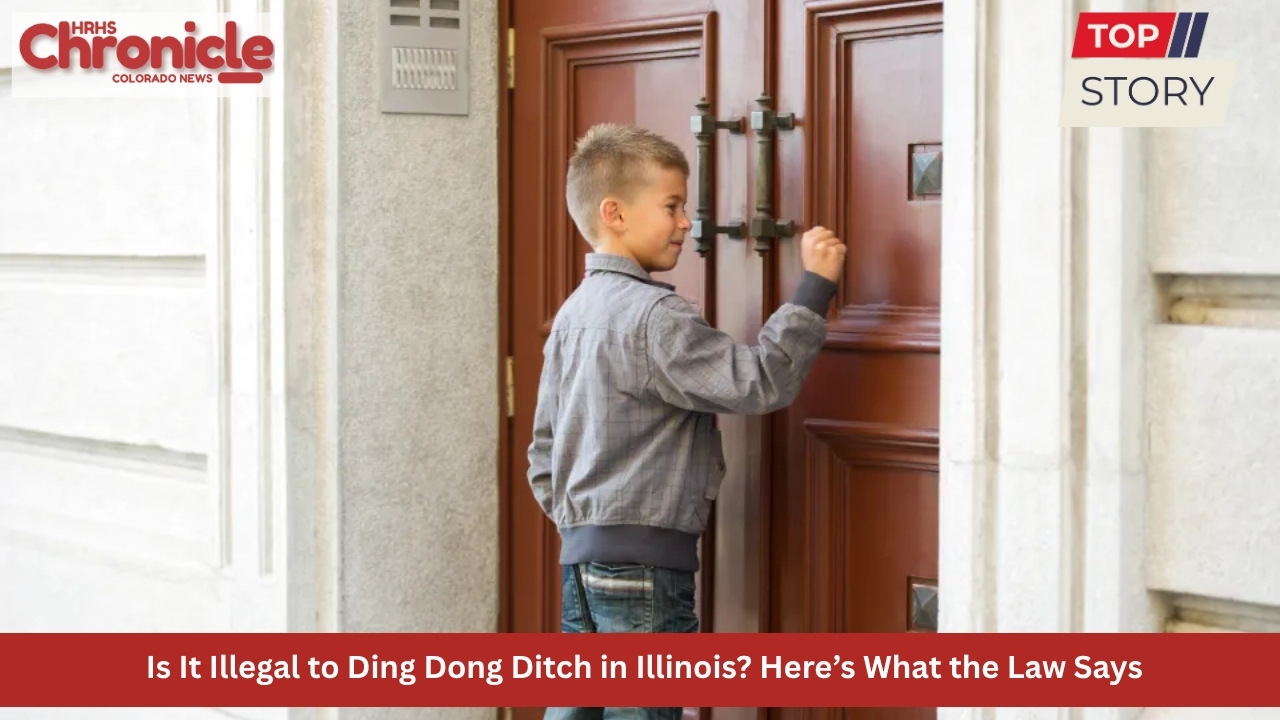Illinois – Ding dong ditch may seem like a harmless childhood prank, conjuring memories of laughter-filled evenings. But in Illinois, the question of whether ringing and running is simply mischief or a brush with the law is not as clear as you might think. This article takes an exhaustive look at what state statutes, local ordinances, and real-world cases say about ding dong ditching throughout Illinois, from Chicago’s bustling suburbs to small towns like Shorewood and Naperville.
Understanding Ding Dong Ditch: A Timeless Prank
Ding dong ditching, sometimes called “knock knock run,” “ring and run,” or “knocky nine doors,” has been a staple among mischievous youth for generations. The game is simple: sneak up to a home, ring the doorbell, and sprint away before anyone answers. In the digital age, viral videos and doorbell cameras have made the prank even more tempting — and traceable. While many see it as a rite of passage, others consider it a nuisance, or worse.
Is Ding Dong Ditch Illegal in Illinois? The Legal Landscape
Illinois law does not have a statute that specifically mentions ding dong ditching by name. However, that doesn’t mean the prank is entirely safe or without legal risk.
Trespassing Laws
The most common way authorities address ding dong ditch in Illinois is under trespassing laws. According to the Illinois Compiled Statutes (720 ILCS 5/21-3), entering someone else’s property without permission is considered criminal trespass. If you walk onto a porch in Springfield, Evanston, or Aurora with the intent to cause mischief, you may have already violated the law, even if you never set foot inside the home.
Harassment and Disorderly Conduct
Repeated pranks or targeting a specific home—such as what happened in Shorewood, where a boy repeatedly disturbed a neighbor over weeks—can escalate the allegation to harassment. Harassment in Illinois can include any repeated conduct meant to alarm, annoy, or torment another person.
Disorderly conduct (720 ILCS 5/26-1) is another statute prosecutors may use. Disorderly conduct broadly refers to behavior that disturbs the peace or alarms the public. An officer in cities like Chicago, Joliet, or Peoria may pursue charges if the prank causes substantial disruption, frightens a homeowner, or sparks a neighborhood disturbance.
Local Ordinances and Community Standards
Different cities and villages across Illinois may have their own additional ordinances:
-
In Oswego, police have warned parents in recent years that doorbell pranks are escalating in aggression, sometimes involving kicking or beating on doors. Authorities there caution that more forceful acts could result in serious charges, sometimes even home invasion if the act is perceived as an attempt to enter or threaten the safety of residents.
-
In Mount Prospect, incidents of ding dong ditchers causing property damage have brought further police investigation and attention, leading to possible charges of vandalism or criminal mischief in addition to trespassing.
Suburbs like Naperville, Schaumburg, and Elgin also routinely remind residents that even if the prank doesn’t rise to a felony, it puts both pranksters and homeowners at risk.
Real-World Cases: When Ding Dong Ditch Crosses the Line
Illinois courts have seen dramatic cases spring from repeated pranks. One striking example is from Shorewood, where an insurance agent filed a lawsuit for $50,000 after weeks of repeated doorbell ringing caused him anxiety, sleep problems, and even loss of income. The suit proceeded after police confirmed the confession of a 14-year-old neighbor.
In incidents where the doorbell ditching escalates—for example, a group repeatedly targeting the same address in South Elgin or adding vandalism into the mix—charges have included criminal trespass, harassment, and sometimes even civil lawsuits for emotional distress or property damage.
Is Ding Dong Ditch a Misdemeanor or Felony?
Most ding dong ditch cases in Illinois, if prosecuted, are classified as misdemeanors. First-time offenders, especially juveniles in cities like Rockford or Decatur, often receive warnings, community service, or fines. However, repeated offenses, causing property damage, or any escalation that threatens residents’ sense of safety could potentially bring about more serious charges. If a prankster’s actions are perceived as an attempted break-in, police in places like Oswego warn that this could lead to felony charges, such as attempted home invasion.
Fines for trespassing and disorderly conduct can range from relatively minor amounts to several hundred dollars. Community service is sometimes ordered, especially for teens. In severe or repeated cases, the consequences can linger on a juvenile or adult criminal record.
The Safety Risks: More Than Just a Joke
While legal consequences are a major consideration, there are other dangers associated with ding dong ditching. Homeowners, feeling threatened, have sometimes responded forcefully — in some cases, even arming themselves. There have been tragic incidents nationwide where pranks led to violence, injury, or worse.
Moreover, an increasing number of Illinois homes are equipped with video surveillance systems and smart doorbells, making it far easier to catch and identify pranksters. Communities such as Barrington, Vernon Hills, and Champaign report that many pranks are now caught on camera, and police can follow up even after the fact.
What About Minors? The Juvenile Justice Approach
If minors are caught ding dong ditching in Illinois, the approach is often educational before punitive. Police in many Illinois towns prefer to issue a warning or call parents for a first offense. However, persistent conduct, property damage, or escalation to harassment or invasion can result in formal charges.
Some communities have partnered with schools and youth organizations to educate about respect for others’ property and the risks of trespassing. Social workers in larger cities, from Chicago to Rockford, may become involved if the prank is part of a broader pattern of misbehavior.
What to Do if You’re a Victim
If you’re a resident in Illinois and believe you’ve been repeatedly targeted by ding dong ditchers, document the incidents—camera footage, dates, times—and contact your local police. Most law enforcement agencies, from Springfield to Naperville, will issue a warning first, but persistent harassment or damage should be reported.
Consider posting a notice, installing a camera, or talking to your neighbors. Many communities have found that neighborhood watch groups and open lines of communication can help deter pranks gone wrong.
The Role of Technology: Doorbell Cameras and Social Media
The evolution of doorbell cameras has transformed how ding dong ditch incidents are reported and prosecuted. Apps and neighborhood groups on platforms like Nextdoor and Facebook allow residents of Chicago, Aurora, and other cities to quickly share footage and alert police or each other.
For pranksters, this means there are far fewer truly anonymous getaways. In some cases, damage or repeated annoyance caught on video has led to not only police calls but also civil lawsuits, as seen in the Will County incident.
Conclusion: The Final Word on Ding Dong Ditch in Illinois
While the act of ringing a doorbell and running away might seem trivial, Illinois law interprets the actions in context. Trespassing, harassment, and disorderly conduct are all potential legal consequences, with severity depending on factors like intent, repetition, and impact on victims.
For those living in Chicago, the suburbs, or rural areas, it’s wise to treat ding dong ditching as more than a childhood prank. Respect for neighbors, awareness of legal consequences, and an understanding of how quickly things can escalate are essential. Parents, teens, and homeowners all play a role in preventing unnecessary distress, keeping communities safe, and making sure everyone understands how quickly mischief can become a matter of law.

Mrs. Odice has been a teacher here for 9 years. She likes yoga and spends most of her time with her 3 kids. She also grew up going to Douglas County schools and is Canadian.















Leave a Reply